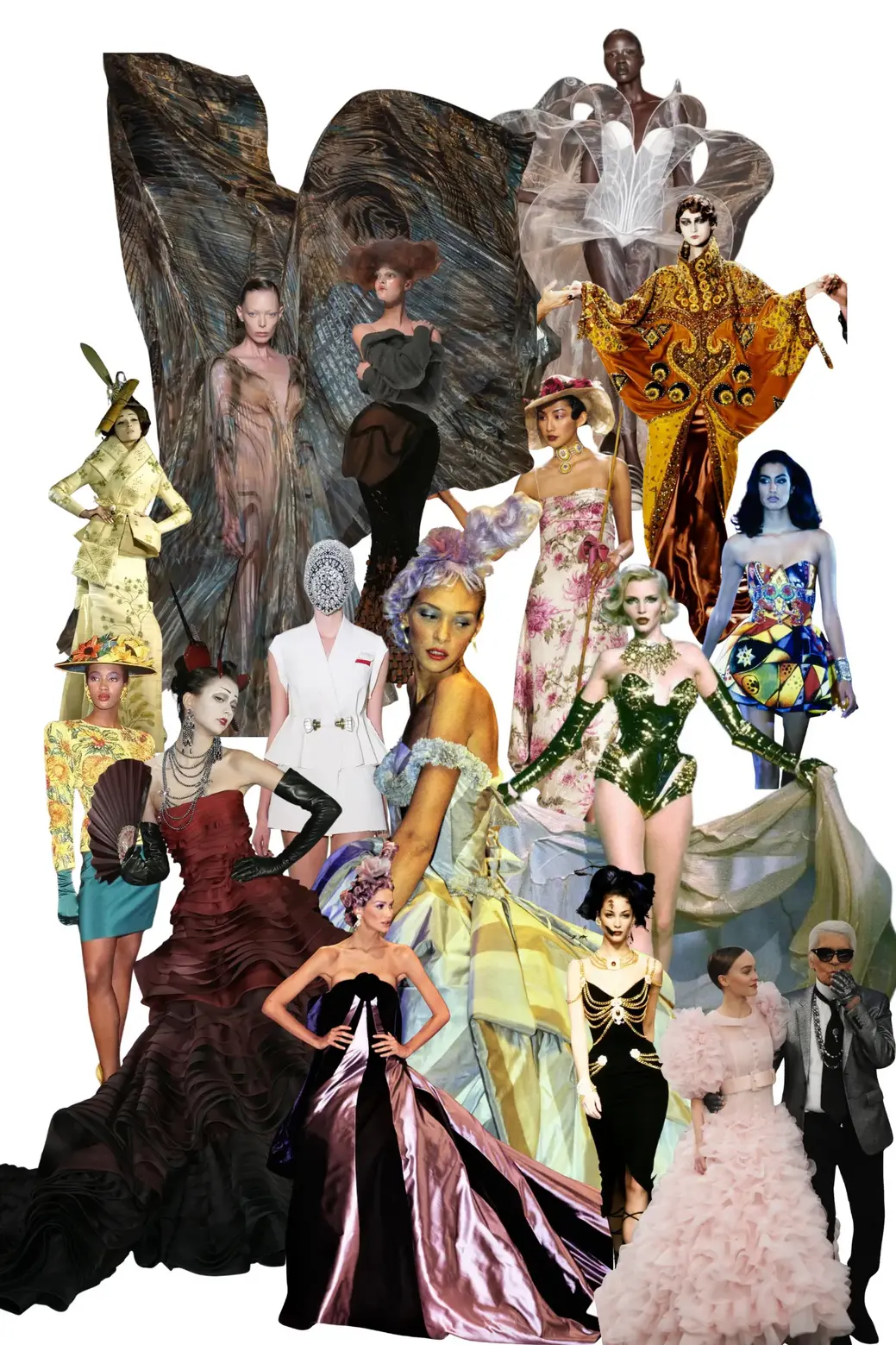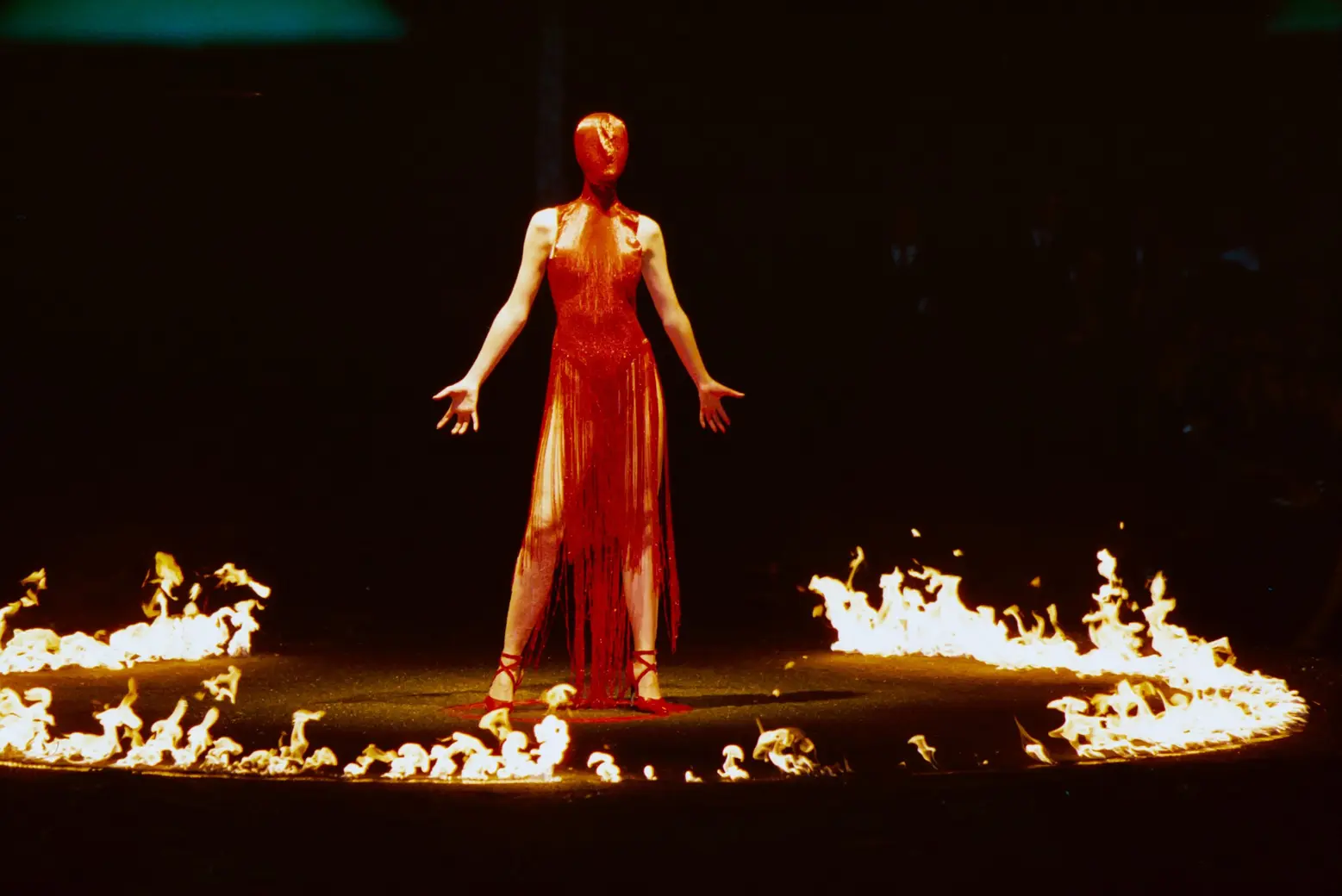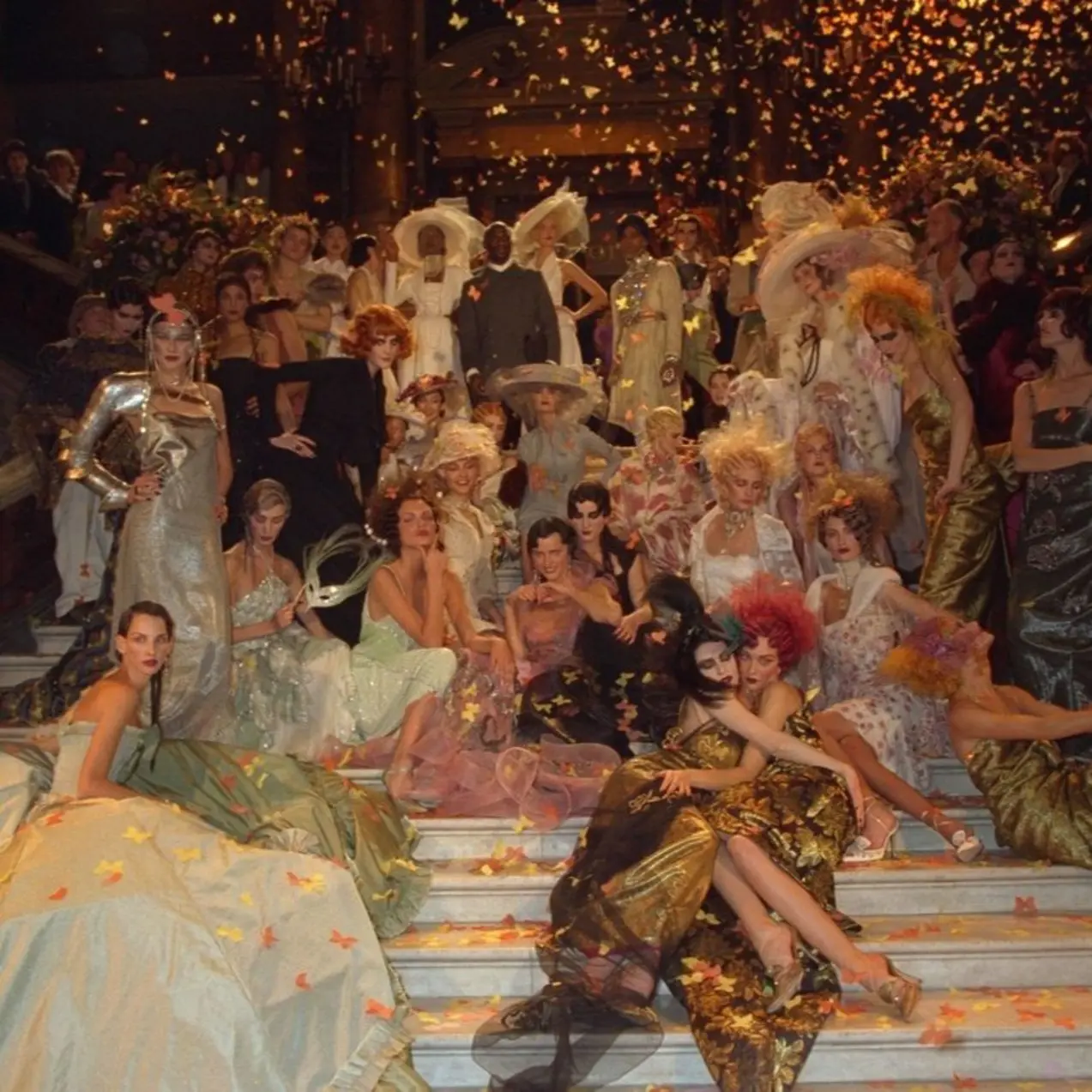Haute couture is fashion’s most sacred theatre, where silk becomes armor, and stitches spark revolutions. These 15 legendary collections carved their names into the very soul of style

Haute couture is fashion’s most sacred theatre, where silk becomes armor, and stitches spark revolutions. These 15 legendary collections carved their names into the very soul of style
October 1, 2025
They say Rome was not built in a day, neither is a haute couture gown. "Haute couture" in France, translating to “high dressmaking” - not just fashion - it is the Mount Olympus of style. In a world of mass production and “add to cart,” it is the stubborn, glorious reminder that some things are still made for one person and only one.
In hidden Parisian ateliers, twenty or more artisans bend over silks and chiffons, their hands weaving embroidery, feathers, and pleats with precision that feels almost impossible. Each piece demands not just fittings but devotion, hundreds of hours of human touch, and techniques handed down like heirlooms.
Only a handful of fashion houses are allowed to call their creations “haute couture,” a title guarded by the "Chambre Syndicale de la Haute Couture" as fiercely as a royal seal. The rules are strict: an atelier in Paris staffed with at least 20 artisans, garments made-to-measure for private clients, and 50 original designs unveiled twice a year. This is a fashion’s equivalent of writing sonnets by hand.
Haute Couture is where ideas are born, where impossible silhouettes and centuries-old stitches rewrite what clothing can be. Though only a few thousand will ever wear these treasures, their influence ripples throughout fashion history. And some collections did not just ripple. They roared, reshaping style forever. Here are the 15 greatest haute couture collections of all time, the ones that turned runways into legend.
In 1938, as Europe edged toward war, Elsa Schiaparelli staged a circus and changed fashion forever. Her Spring/Summer Circus Collection became the first haute couture line built entirely around a single theme. The runway was alive with embroidered acrobats, buttons shaped like tumblers, and hats spinning like carousel tops.
Her surrealist ally Salvador Dalí added shock and wonder: the Tears Dress, printed with trompe -“rips” and veiled in real shredded fabric, and the infamous Skeleton Dress, with padded bones stitched into black silk crêpe, turned anatomy into couture.
Schiaparelli mixed whimsy with innovation by using rayon, plastic zippers, and even a “dhoti” dress that transformed from skirt to culotte. Beneath the carnival colors, subtle tension lingered, hinting at fractured politics. Today, her circus still inspires, proof that fashion can juggle fantasy, art, and history - all, all in one dazzling act.
In haute couture’s 1988 most audacious artistic homage, Yves Saint Laurent translated Van Gogh’s sunflowers, Picasso’s cubist fragments, and Braque’s abstract doves into breathtaking garments. The showstopper: a jacket embroidered by Maison Lesage, with 350,000 sequins and 100,000 beads to replicate Van Gogh’s brushstrokes, with only four Sunflowers pieces ever made. This jacket demands over 600 hours of handwork, turning satin and velvet into living galleries.
With emerging legends like Linda Evangelista, Naomi Campbell and muse Katoucha Niane commanding the runway, the collection fused art history with fashion prophecy. Decades later, its legacy endures: Van Gogh’s sunflowers jacket sold for €382,000 at auction, cementing YSL’s truth: "couture is art you inhabit".
Karl Lagerfeld’s Spring/Summer 1992 Chanel Haute Couture show was a revolution in pearls and plastic zippers. He gleefully dismantled Chanel’s prim DNA, swapping out prim tweed for raffia lookalikes and carving “diabolically” precise silhouettes with zippered seams sharp enough to rival a surgeon’s.
Christy Turlington stole headlines in a chain-drenched black slip dress - a cheeky, the parody of Coco’s Little Black Dress but drowning in enough gilded chains to outfit a pirate ship, became the poster child for Lagerfeld’s glorious rebellion. Tattered chiffon skirts whispered of “poetic ruins,” jackets masqueraded as paintings, and gold circus buttons winked at excess. And then came Claudia Schiffer, closing the show in a rebellious bridal look: a corseted gown unzipped down the front, cathedral veil flowing, as if Chanel herself had eloped with rock ‘n’ roll.
Thierry Mugler’s 1995 circus was not clowns and cotton candy, it was a cyborg riot under the big top. Imagine a three-ring sci-fi circus where robots marched in liquid silver armor (crafted over 300 painstaking hours) and supermodels doubled as motorcycle-riding goddesses. Naomi Campbell, gleaming like a chrome Valkyrie, proved that even androids could serve lewk. Mugler’s carnival twisted tradition into surrealist fantasy: a 24-karat gold python corset, worn with breathtaking audacity, shared the stage with trapeze-artist bodysuits dripping 10,000 crystals. Then, the coup de théâtre: George Michael descending from the ceiling in feathered wings, belting “Freedom! ’90” as if the fashion apocalypse needed a soundtrack. Decades later, DNA collection lives on in Beyoncé’s stage armor, Iris van Herpen’s 3D organisms or latest is Zendaya revived the collection’s rare robot look at the Dune: Part 2 premiere. As Mugler purred: "Extravagance is my minimalism."
Gianni Versace detonated a glitter bomb at fashion’s ivory tower. The collection screamed Warhol: Marilyn Monroe’s lips smoldered across cocktail dresses; James Dean’s brooding gaze transformed into sequined mosaics. But the true revolution was on the runway. As George Michael’s "Freedom! ’90" pulsed, the original supermodel pantheon: Naomi Campbell, Cindy Crawford, Linda Evangelista, and Christy Turlington stormed the catwalk arm-in-arm, grinning in harlequin-print minidresses and Baroque gold chains. This moment catapulted models into global superstars and redefined fashion shows as cultural spectacles. As critic Tim Blanks noted, it offered "things unlike anything I would ever see again". Decades later, Donatella resurrected these prints for her 2018 tribute, sending the same legends down the runway. Why? Because true freedom never goes out of style.
Haute couture’s rulebook was shredded the moment John Galliano took Givenchy’s reins. Just hours after Hubert de Givenchy’s farewell, the British provocateur commandeered Paris’ Stade Français stadium - transforming it into a time-traveling cabaret. Forget whispered elegance: models burst from a Princess and the Pea, inspired tower in cartoonish, volumes gilded crinolines colliding with Cleopatra’s sari silk, Helmut Newton tailoring sliced beside 1920s fringe. Carla Bruni channeled Audrey Hepburn in a noir column dress, a sly wink to Hubert’s legacy, while gold lamé gladiators stomped past like disgruntled royals. Critics gasped at the punkish irreverence, but Galliano’s genius was clear: he made history wearable theater, not a relic. The collection’s DNA, historical mash-ups, stadium-scale drama - later fueled his Dior triumphs and Alexander McQueen’s rebellions.

Haunted by the gilded statue of Joan of Arc outside his Paris studio, Alexander McQueen forged her into fashion’s most incendiary armor for his Autumn/Winter 1998 "Joan" collection. Models became warrior-saints with shaved scalps and silver chainmail, marching through ashen trenches. The fiery climax featured a model entombed in a bugle-beaded gown, swaying inside a literal ring of fire. For McQueen, this pyrotechnic spectacle was no mere theatre; it was a £70,000 sacrament that weaponized couture. It was designed as "armor against innocence," protecting women from naiveté and electrifying their power through a narrative of martyrdom and rebirth.

Fashion history holds few tableaux more iconic than Dior’s SS1998 finale: a legion of velvet-clad muses posed on the Opéra Garnier stage, gilded light illuminating Art Nouveau brocades and molten silver "armor" sleeves as hand-cut butterflies swirled like living brushstrokes. Galliano summoned the spirit of Marchesa Casati - eccentric patroness of snakes and surrealism, transforming Dior’s heritage into a time-traveling opera. Duchess satin corsets collided with 1920s fringed coats; lace veils dissolved into metallic lurex. Every ruffle paid homage to founder Christian Dior’s love of theater, yet Galliano’s genius lay deeper: he resurrected the house’s dormant avant-garde soul, proving couture could marry historical reverence with operatic crescendo, where Baroque grandeur met modernist rebellion.
Imagine fashion as a live transformation ritual: a single model, ten layers, and a silent scream about excess. For FW1999, Viktor & Rolf staged haute couture’s most daring live 15-minute-ritual, only one model - Maggie Rizer stood motionless on a rotating platform as the designers cocooned her in real time: first in burlap, then lace, then crystal-crusted brocade until she vanished under sculptural weight. Shoulders rose like cathedral spires; a floral garland crowned her imprisonment. This was not a show, but a matryoshka doll of critique: each layer mocked fashion’s relentless churn. André Leon Talley called it "the Viagra of couture week," and he was right. In 15 hypnotic minutes, the duo proved clothing could suffocate as easily as seduce. Today, as fast fashion drowns us, Rizer’s petrified elegance still whispers: when does more become too much?
Galliano spun Puccini’s Madame Butterfly into silk-and-dreams that season, draping Dior’s atelier in a Tokyo-Paris daydream. Forget subtlety! Think kimono sleeves slicing through air and obi belts cinching waists into waspish drama, all painted in electric cherry-blossom pinks and lacquer-reds. The collection showcased origami-inspired sculpting: peplums folded like paper cranes, straw jackets hovering like ghostly kimonos, and a chartreuse gown that practically sighed with every step.
The pièce de résistance? Supermodel Shalom Harlow floating down as the "geisha bride," diamond twigs glinting in her hair – equal parts tragic heroine and couture conquest. Critics swooned; Galliano smirked. After all, who else could make straw look like spun gold and heartbreak look this chic? This was a love letter to beauty’s fleeting grace, stitched with Galliano’s delirious romance. Proof that even butterflies can wear haute couture.
Valentino Garavani’s farewell collection after 45 years was a masterclass in signature codes. He opened with airy pastels: a fondant-orange bias-cut gown, a pink gazar trapeze coat (light as spun sugar), and crystallized white collars that caught light like frost. Precision defined every piece: knotted satin, surgical draping, lace veiled with mystery.
Then, the coup: every model returned in identical "Valentino red" gowns, his iconic hue since 1959. The walls projected the same dress, flooding the room in scarlet. No speeches followed; just a silent bow. Critics called some looks "out of step" with 2008’s edge. Valentino’s rebuttal? 70 looks of timeless glamour, proof that elegance needs no trend.
Creative directed by John Galliano, Maison Margiela turned haute couture into surreal archaeology. Discarded objects became luxury: baseball gloves morphed into sculpted boleros, a neon windsurfing sail transformed into a tech coat, and a 1905 tailcoat got a crystal doorknob closure. Each piece whispered history hijacked like Edwardian lace reborn as minimalist trousers or Art Nouveau beadwork quilted onto bombers.
Models walked masked in crystal-encrusted veils, anonymizing wearers while spotlighting craft. Just 15 looks, but each screamed Margiela’s ethos: couture as radical recycling. No fanfare, no designer bow; just a quiet rebellion against waste and celebrity culture.
Inspired by an Art Deco kaleidoscope, Karl Lagerfeld went "less is more" at the Grand Palais - unless "less" meant 10,000 hand-stitched feathers on a single gown. Inspired by Giacometti’s curvaceous sculptures, silhouettes featured raised waists and soft hip draping, modernizing Chanel’s tweed DNA.
Tweeds came sharp enough to startle such as mint, peach, and lavender - paired with wide belts and ’80s shoulders. Then, the glitz detox: feathers replaced sequins. A dove-gray crinoline floated on thousands of hand-sewn marabou plumes, while crystal masks added mystery without clutter. Evening’s climax? Karl's muse, Lily-Rose Depp in wedding pink organza flounces, light as a sigh. Lagerfeld’s message screamed softly: true luxury is not spectacle, it is a perfectly curved seam.
John Galliano plunged Paris into a rain-lashed noir sonnet beneath Pont Alexandre III. Models emerged from a phantom cabaret, hips swaying in brutally cinched corsets that left visible bruises - fashion as survival armor for midnight’s "renegades." Tulle gowns slashed with moving tears mimicked rain-soaked cardboard, while jackets glittered with hand-embroidered raindrops.
Oversized coats became shields, torn stockings hid "stolen" jewels, and veiled eye masks whispered danger. The haunting finale? Gwendoline Christine as a shattered porcelain doll in liquid latex - Galliano’s decade at Margiela crystallized in one fragile moment.
Some garments not just walk down the runway, they glide, glow, and whisper secrets from the seabed. In Iris van Herpen’s latest haute couture spectacle, the boundary between organism and outfit dissolves entirely. From a bioluminescent gown glowing with 125 million living algae to kinetic coil wings that flutter like microscopic sea spirits, this collection is less a fashion line and more a living ecosystem on the move. Van Herpen weaves biofabricated proteins, carbon-fiber currents, and whisper-light “air” fabrics into silhouettes that do not walk so much as float. Think of it as couture meets deep-sea documentary, if Jacques Cousteau had a penchant for laser-cut carbon fiber. In a time when fast fashion chokes oceans, Van Herpen’s marine symphony feels like couture's gentle rebellion: thoughtful, otherworldly, and slightly phosphorescent.